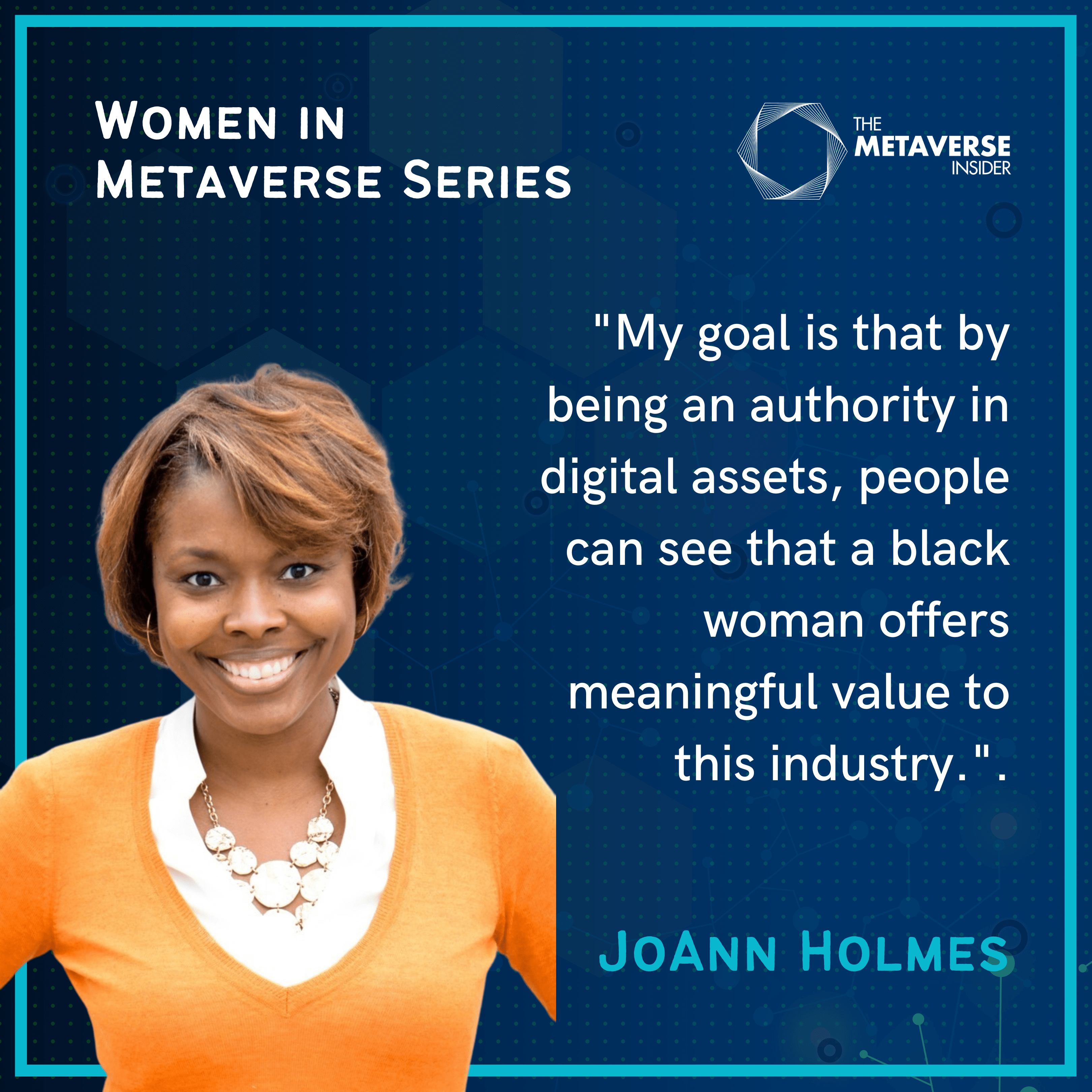As the metaverse industry continues to grow, many legal questions arise. From cryptocurrency regulation to protecting brands in the metaverse, copyright licenses in generative art to liability risks for DAOs, there are a maze of laws that impact the space. And, they seem to be ever-changing. It’s difficult for companies to navigate.
Working to guide organizations through this legal labyrinth are strategists like JoAnn Holmes, an Intellectual Property and Digital Assets attorney and advisor who has been recognized as one of the global Top 100 Women of the Future. Since graduating from Stanford in 1996, she has served on management teams of international companies, overseen intellectual property assets all over the world, and protected IP worth over $2 billion dollars in annual revenue. Holmes launched her firm, Holmes@Law, in 2015.
“IP and technology always go hand-in-hand for me,” explained Holmes. More specifically, she has focused on global brands, software and the internet. However, when blockchain technology advanced, she realized that Web3, including, the metaverse, NFTs and DAOs, are the next innovations in need of industry-specific legal advice.

So, she pivoted her work to focus on digital assets law and revenue strategy. “It was a big step,” she said. “But, I was excited to offer support where there’s a clear need in emerging innovation. As I researched digital assets, I realized that all of Web3 is intellectual property,” said Holmes. “I’ve been an IP attorney for over 23 years. That gave me a foundation to explore this space.” She even found that the young people in her family were already involved in Roblox, a metaverse platform.
This made her even more interested. “I believe that the metaverse is driving a transition from existing gaming into digital worlds with more immersive commercial, entertainment, and educational experiences,” Holmes said. “That was really exciting for me as both an attorney and business strategist.”
Holmes spoke to her particular interest in advising small and midsize businesses about how to leverage blockchain technologies. She offered examples, explaining that utility NFTs can unlock discounts, be used for access to in-real-life and online metaverse experiences, and to build customer loyalty.
They can reflect membership, link to subscription benefits, and could be sold as digital art that provides access to companion physical goods and services. “Although there’s been extensive reporting about how major brands are using NFTs, there’s not been enough attention to how SMEs can leverage them to offer substantive customer value, and open new revenue streams. Digital asset monetization strategy is what I love to do!”
Holmes focuses on three levels of support for her clients. “First, I help those with an existing customer base, or loyal community of followers, to design meaningful Web3 offers. Instead of using gimmicks, we evaluate the client’s brand and culture to build new ecosystems of value that maintain both trust and engagement.
Secondly, I of course offer legal advice, looking not only at legal risks, but also highlighting opportunities to leverage the law for business advantage. Thirdly, I provide legal and strategic advice for scaling organizations, to help them leverage momentum, avoid legal risks, and grow smartly. I see patterns across the myriad of Web3 clients who I advise, so I can help them implement strategies that best suit their goals, while balancing respect for their communities.”
On a more personal note, Holmes believes that Web3 creates opportunities to build more egalitarian IP based wealth. “Blockchain tech can expand access to marketplaces and financial systems for those who have not traditionally had those resources available. Specifically, cryptocurrencies, NFTs and the metaverse offer women and girls in the developing world an opportunity to build community, and be compensated fairly for their value as creators and innovators.”
She adds, “I was at Stanford when Google and Yahoo were being built. So, I saw the wealth in internet companies primarily accruing to a limited demographic. I want to change that with Web3, so that it’s inclusive by design.” Holmes believes that representation of marginalized communities in emerging tech sends an important message. “I’m purposefully visible and regularly speak at conferences, on podcasts, and through interviews to show that all are welcome in the metaverse. “I am a Web3 lawyer,” she explained, “and my goal is that by being an authority in digital assets, people can see that a Black woman offers meaningful value to this industry. Hopefully, that opens the door a bit wider for other underrepresented people.”
Holmes worries that the negative media coverage of cryptocurrencies, the metaverse and Web3 technologies is turning away diverse groups from entering this space. However, she hopes that her work not only helps to make the metaverse more equitable, but also more welcoming. To other women and minority groups, she asks “please look into this industry, we need your skillset in this space. I see so many opportunities at an early stage for those who have been historically left out,” Holmes said. “And, I don’t want these opportunities to be missed.”
She tries to offer pragmatic guidance about how to get started, whenever possible. “Learn as much as you can,” she stated. “Find several trusted resources. Search LinkedIn and Google to gather information about other professionals in the industry. Watch videos and listen to podcasts to learn how to apply the technology in business. Then, you can become a Web3 expert for yourself, for your business as an entrepreneur, or as an employee within your company. That knowledge will be valuable into the future.”
For more market insights, check out our latest Digital Twin news here.













